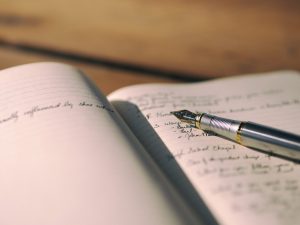Chapter 12: What Have I Accomplished? Conclusion and Final Assessment
Revising Your Thesis and Body Paragraphs
Before you begin revising your work, it would be useful to review both the three-storey thesis that you wrote as part of Chapter 9 and the paragraph-by-paragraph skeletal outline that you created as part of Chapter 11. It may even be useful to print these two documents and read them side-by-side so that you can compare the structure and content of what you had planned to argue with what you actually argued in your essay. This is not to say that your initial thesis and your outline need to be identical to what you wrote in your essay. Rather, they provide the broad outline of your thoughts and argumentative structure and will help you assess the strength of your argument during this revision stage.
Broadly, the most effective way to revise your essay is to make it unfamiliar to yourself. Because you know the argument you want to make, there is a danger that you will make assumptions and logical leaps within the work that an outside reader would not make. Therefore, you need to approach your essay as if someone else wrote it so that you can objectively evaluate its strengths and weakness. Some strategies to help you do this include:
- Printing your essay and reading it as a hard copy: Often when we read on our computer screens, even in a word processing program, we gloss over the text and do not read as carefully as we should. Moreover, reading on a computer provides an environment with many potential distractions. Print your essay and read it.
- Read with a pen in your hand: Taking notes and responding by hand in the margins on your own work will ensure that you are remaining an active reader of your own argument.

From Pixabay. - Read your essay in a different room: This is similar to reading a hard copy of your work. Moving to a different writing environment will help defamiliarize the text and provide you with a new perspective on your own argument.
- Read your essay out loud: Reading your own work out loud is a great way to hear how your argument sounds. This will be helpful for understanding your whole essay and whether the paragraphs link together logically.This technique will also help you identify any awkward style or errors in grammar or punctuation. If you stumble over a sentence when you are reading it out loud, there is likely something in that sentence that needs to be fixed.
Now that you have taken steps to make your essay and argument seem less familiar, you need to set some specific goals for your revision. You have a lot to reconsider, so setting specific goals will help you revise your essay effectively. You need to reconsider the final version of your thesis that you have been complicating and reformulating during this process. And you need to reconsider your use of primary and secondary evidence, as well as your analysis of these elements. In this way, it is useful to edit in small, iterative waves with specific goals for each wave. It is very difficult, for example, to revise paragraph-to-paragraph transitions, grammar, thesis construction, and integration of research in a single pass. Instead, each of these concerns should be separated into its own wave and you should read your essay with that one specific concern in mind.
At this point, revising your essay means asking a number of questions of your own writing. By asking one specific question as you read your essay, you will stay focused in your revising process and strengthen your argument from many directions. You will be asking both large- and small-scale questions; some questions will address your writing at the word, sentence, and paragraph level, and some will concern your essay as a whole. Again, you cannot address all these issues at once, so give yourself a specific task with each reading of your essay.

